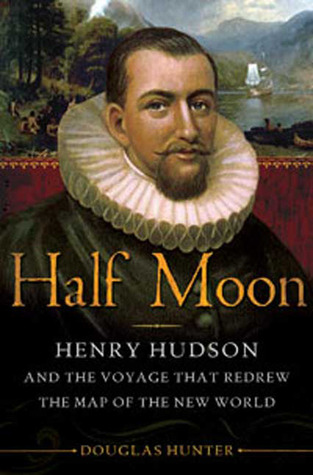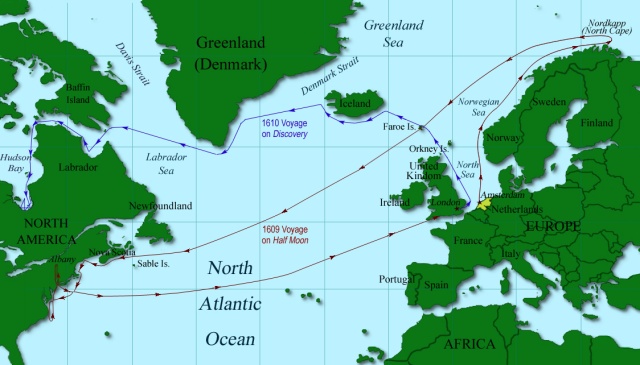Note: This book is reviewed by my husband Jim.
Apparently it is not always easy to recognize a good harbor while sailing along the coast of a continent. For example, Francis Drake sailed right past the Golden Gate without noticing it on his famous circumnavigation of the globe. And quite a few French, English, and (maybe) Spanish explorers sailed right past the entrance to New York harbor without noticing it. John Verrazano “discovered” the entrance to the harbor in 1524, but did not explore the area enough to realize its potential; moreover, he never penetrated the harbor far enough to become aware of the large river that empties into it from the north. Not until 1609, when Henry Hudson piloted the Half Moon on a strange voyage of discovery, did Europeans learn of the great harbor and the strategic transportation corridor of the Hudson River Valley.
Hudson’s employers must have been indeed surprised by the results of his voyage, since he had been hired to try to find a Northeast passage (around Russia to the north) to the Orient! How Hudson ended up exploring the east coast of the America instead is the subject of Douglas Hunter’s Half Moon: Henry Hudson and the Voyage that Redrew the Map of the New World.
Hudson was in the employ of the Dutch East India Company (known as the VOC) when he made his historic voyage. He had attempted, but failed, to find a northeast passage to the Orient in 1608. When he tried again in 1609, he encountered rough weather near Norway. He might have returned to port in Amsterdam; instead, he made a 3,000-mile detour and headed across the Atlantic. Several earlier cartographers had speculated that a large river traversed the North American continent all the way to the Pacific, and in violation of his charter with the VOC, Hudson set out to find it.
Recreating Hudson’s actual voyage is difficult because no logbook has survived. Instead, we have only the diary of one of his crew and later recorded oral history of some other survivors of the voyage. Hudson tried first at the Chesapeake Bay, hoping to work his way north to what we know as the Potomac River, but was frustrated by the presence of the English colony at Jamestown and an English vessel that might have been a war ship. So he left the Chesapeake and voyaged north, coming upon the Verrazano Narrows and ultimately the New York harbor and what we now call the Hudson River.
He ventured up the Hudson near present day Albany, where the river ceased to be navigable, which was no mean feat of sailing. He hoped to cross the continent, or if not, at least to make it to the St. Lawrence River. (As we now know, there is no transcontinental river, but Hudson contributed greatly to the European understanding of the geography of eastern North America. His voyage inspired the Dutch to colonize the New York area.)
Frustrated, Hudson returned to Europe, but he did not return to Holland; instead, he stopped at Dartmouth, England. From there he was able to arrange another voyage of discovery, this time to find a northwest passage around Canada. That trip resulted in the discovery of Hudson Bay. Hudson’s crew mutinied on that voyage and abandoned him, his son, and a few loyal crew members to their fate—they were never seen again.
Evaluation: Hunter’s book is a fairly scholarly attempt to recreate the voyage of the Half Moon. It does contain several very informative small-scale maps, but I recommend keeping a good atlas handy while reading this book. Although it focuses primarily on a single voyage, the book provides a good insight into how long and piecemeal the process of discovering and exploring the New World was for Europeans. Nevertheless, it is not always a very readable book in that it discusses in great detail where the Half Moon was on particular dates. It may primarily be of interest to specialists in Hudson the man, Hudson the water, and/or exploration in general.
Rating: 3/5
Published by Bloomsbury Press, 2009











I loved reading your thoughts on this book. Of course, this is not one that I would read myself but the thought of exploration is fascinating to me.
I’m sure this is a great book, but if it’s scholarly, I’m sure it’s over my head.
That was really interesting. I know of Hudson from history classes but that’s it. I had no idea about the cross continental river idea or how hard it was to discover harbors. Very interesting. Thanks.
Wow..what a great review. I felt like I was in a History class. That is a good thing. I hope to read books like this in the future. I find it all so very fascinating.
Isn’t it some anniversary of Hudson’s voyage? (<– clearly, I am ignorant.) I feel that there are a few books out about it now.
I am currently reading a novel that involves pirates and some of the terminology is getting very tiring to hear over and over. I hope this book isn't so technical!
I knew hardly anything about Hudson prior to reading this review. I was especially interested to learn about the mutiny of his crew – how sad that he and his son were abandoned and their fate unknown.
I just finished reading Dan Simmons’ The Terror about the Franklin expedition, and it really surprised me how ill-equipped they were for arctic expeditions.
This sounds like it might be a bit too specialized for me, but I’d love to read a book on explorers sometime. It’s such a fascinating topic. Though I’m very grateful to be alive now as opposed to a few centuries ago, I wish I could experience what it felt like to live in a world that was still largely unknown.
Maybe a bit too scholarly for regular reading for me but it would be interesting to read a little bit at a time, I think.
I’m sure I would have been the type of explorer to miss things like harbors, mountains and entire continents!
I totally agree with you. I read this book a while back and I kept getting bogged down with all the details. The writing was very good, but the text laborious with too much information.
I learned a lot, but not so sure how much I really care to know about this part of history. LOL I never did review this one for that reason.